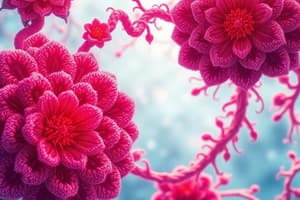Podcast
Questions and Answers
Atoms bond together to form cells in biology.
Atoms bond together to form cells in biology.
False (B)
Mitochondria produce energy in the form of light.
Mitochondria produce energy in the form of light.
False (B)
Prokaryotic bacteria have complex cellular structures compared to eukaryotic organisms.
Prokaryotic bacteria have complex cellular structures compared to eukaryotic organisms.
False (B)
Understanding genetics is not relevant in solving medical mysteries.
Understanding genetics is not relevant in solving medical mysteries.
Genetic mutations play a role in the evolution of new species.
Genetic mutations play a role in the evolution of new species.
Gene flow is one of the processes involved in evolution according to the text.
Gene flow is one of the processes involved in evolution according to the text.
Cell signaling involves communication pathways inside cells only.
Cell signaling involves communication pathways inside cells only.
Ecology studies interactions between organisms, communities, populations, and ecosystems.
Ecology studies interactions between organisms, communities, populations, and ecosystems.
Evolution solely relies on random changes without any selection pressures.
Evolution solely relies on random changes without any selection pressures.
Biology does not play any role in shaping the evolution of organisms.
Biology does not play any role in shaping the evolution of organisms.
Understanding cell signaling has no impact on the development of treatments for diseases.
Understanding cell signaling has no impact on the development of treatments for diseases.
Knowledge gained in ecology has no practical applications in protecting vulnerable habitats.
Knowledge gained in ecology has no practical applications in protecting vulnerable habitats.
Flashcards are hidden until you start studying
Study Notes
Exploring Science through Biological Lenses
Biology is one of science's most captivating fields, revealing the intricate workings and evolutionary tales woven into every living organism on our planet. In this exploration, we'll dive beneath the surface of life itself and uncover some of its remarkable secrets.
Life's Building Blocks: Molecules and Cells
Atoms bond together to form molecules, which combine to construct cells – these microscopic factories house all biological activity. Cells come in various forms, such as prokaryotic bacteria with their simple cellular structure or multicellular eukaryotes like plants and animals with numerous specialized types of cells working together. These incredible structures contain specialized components including nuclei where DNA lies, ribosomes synthesizing proteins, mitochondria producing energy, chloroplasts converting light to chemical energy, and more.
Genetics: Shaping the Future
Genetic information stored within DNA determines each organism’s unique characteristics. Over time, genetic mutations have led to new species evolving from ancestors via processes such as natural selection, gene flow, adaptation, speciation, and extinction. Understanding genetics provides solutions to medical mysteries, helps us learn how diseases spread, reveals clues about human origins, and guides improvements in agriculture and other industries.
Ecology: A Web of Interactions and Balance
Ecology studies interactions between organisms, communities, populations, and ecosystems, delving deeper into relationships among earth's inhabitants. This field explores mutualistic, commensalistic, parasitic, predatory, and competitive dynamics while also investigating factors affecting the stability and resilience of ecosystems across multiple scales. Knowledge gained in ecology can help reduce threats faced by vulnerable habitats, protect endangered species, restore degraded environments, and sustainably manage resources.
Evolution: Ebb and Flow of Time
Evolution explains how changes occur over generations. It offers insights into why humans look different from chimpanzees despite sharing around 98% similarity in genes. Darwinian natural selection – favoring advantageous traits passed down to offspring – plays a significant role in shaping change throughout history. Researchers studying evolution explore patterns in fossils, trace the ancestry of species using molecular data, analyze the effects of environmental pressures on population growth, investigate behavioral adaptations, and test theories of animal and plant development.
Cell Signaling: Regulating Life's Processes
Cell signaling refers to communication pathways operating inside and outside cells to control crucial functions. Hormones, neurotransmitters, cytokines, peptides, and growth factors serve as messengers, sending signals involved in immune responses, growth regulation, and many more essential activities. Faulty cell signaling often leads to disease states; understanding it aids doctors in developing effective treatments for disorders ranging from diabetes to cancer.
In summary, biology entails an exciting interplay between atoms, molecules, and cells to shape diverse organisms connected through complex webs of interactions driving evolution forward. Studying biology enriches our knowledge of basic life processes and offers tools to address pressing challenges facing humanity today and tomorrow.
Studying That Suits You
Use AI to generate personalized quizzes and flashcards to suit your learning preferences.




